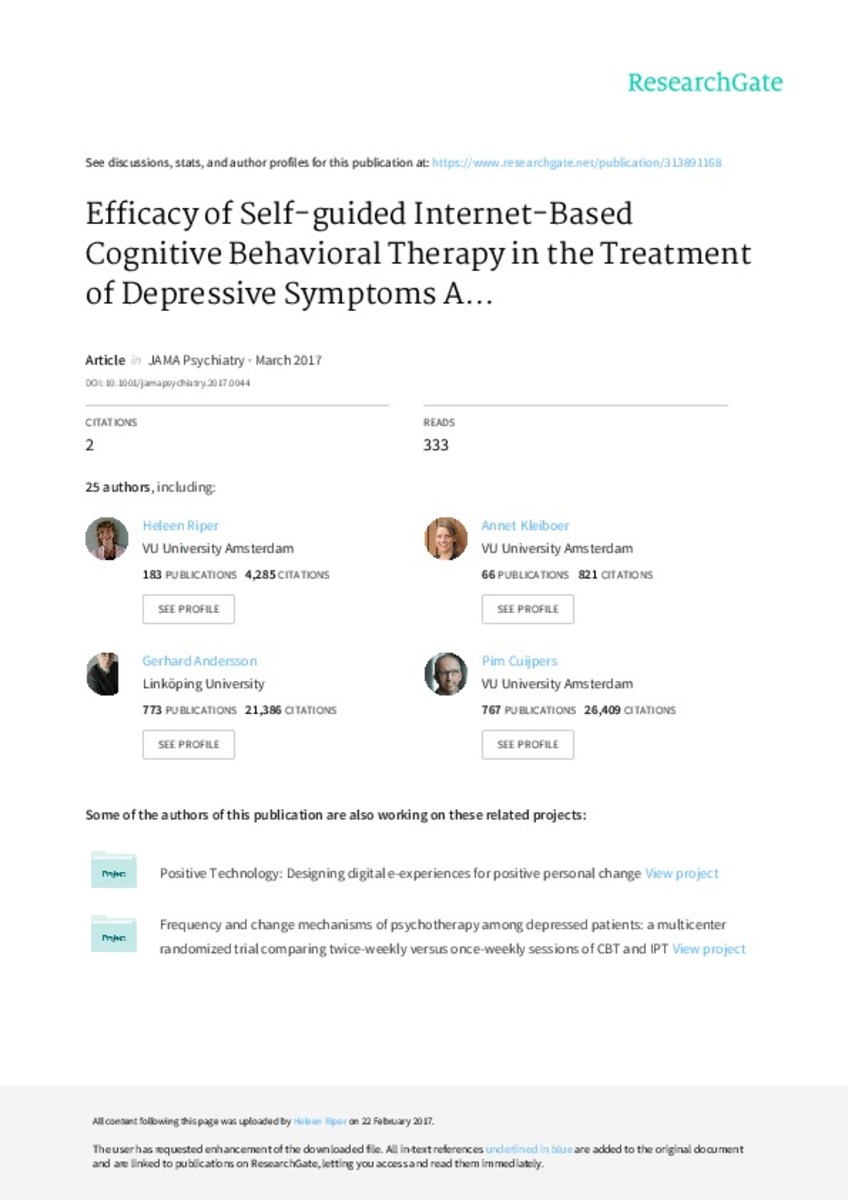Mostrar el registro sencillo del ítem
Efficacy of Self-guided Internet-Based Cognitive Behavioral Therapy in the Treatment of Depressive Symptoms: A Meta-analysis of Individual Participant Data
| dc.contributor.author | Karyotaki, Eirini | |
| dc.contributor.author | Riper, Heleen | |
| dc.contributor.author | twisk, jos | |
| dc.contributor.author | Hoogendoorn, Adriaan | |
| dc.contributor.author | Kleiboer, A. | |
| dc.contributor.author | Mira, Adriana | |
| dc.contributor.author | Mackinnon, Andrew | |
| dc.contributor.author | Meyer, B. | |
| dc.contributor.author | Botella, Cristina | |
| dc.contributor.author | Littlewood, Elizabeth | |
| dc.contributor.author | Andersson, Gerhard | |
| dc.contributor.author | Christensen, Helen | |
| dc.contributor.author | Klein, Jan P. | |
| dc.contributor.author | Schröder, Johanna | |
| dc.contributor.author | Bretón-López, Juana | |
| dc.contributor.author | Scheider, Justine | |
| dc.contributor.author | Griffiths, K. | |
| dc.contributor.author | Farrer, Louise | |
| dc.contributor.author | Huibers, M. J. H. | |
| dc.contributor.author | Phillips, Rachel | |
| dc.contributor.author | Gilbody, Simon | |
| dc.contributor.author | Moritz, Steffen | |
| dc.contributor.author | Berger, Thomas | |
| dc.contributor.author | pop, victor | |
| dc.contributor.author | Spek, Viola | |
| dc.contributor.author | Cuijpers, Pim | |
| dc.date.accessioned | 2017-05-24T07:41:50Z | |
| dc.date.available | 2017-05-24T07:41:50Z | |
| dc.date.issued | 2017-02 | |
| dc.identifier.citation | KARYOTAKI, Eirini, et al. Efficacy of Self-guided Internet-Based Cognitive Behavioral Therapy in the Treatment of Depressive Symptoms: A Meta-analysis of Individual Participant Data. JAMA psychiatry, 2017, vol. 74, no 4, p. 351-359. | ca_CA |
| dc.identifier.uri | http://hdl.handle.net/10234/167633 | |
| dc.description.abstract | - Importance: Self-guided internet-based cognitive behavioral therapy (iCBT) has the potential to increase access and availability of evidence-based therapy and reduce the cost of depression treatment. - Objectives: To estimate the effect of self-guided iCBT in treating adults with depressive symptoms compared with controls and evaluate the moderating effects of treatment outcome and response. - Data Sources: A total of 13 384 abstracts were retrieved through a systematic literature search in PubMed, Embase, PsycINFO, and Cochrane Library from database inception to January 1, 2016. - Study Selection: Randomized clinical trials in which self-guided iCBT was compared with a control (usual care, waiting list, or attention control) in individuals with symptoms of depression. - Data Extraction and Synthesis: Primary authors provided individual participant data from 3876 participants from 13 of 16 eligible studies. Missing data were handled using multiple imputations. Mixed-effects models with participants nested within studies were used to examine treatment outcomes and moderators. - Main Outcomes and Measures: Outcomes included the Beck Depression Inventory, Center for Epidemiological Studies–Depression Scale, and 9-item Patient Health Questionnaire scores. Scales were standardized across the pool of the included studies. - Results: Of the 3876 study participants, the mean (SD) age was 42.0 (11.7) years, 2531 (66.0%) of 3832 were female, 1368 (53.1%) of 2574 completed secondary education, and 2262 (71.9%) of 3146 were employed. Self-guided iCBT was significantly more effective than controls on depressive symptoms severity (β = −0.21; Hedges g = 0.27) and treatment response (β = 0.53; odds ratio, 1.95; 95% CI, 1.52-2.50; number needed to treat, 8). Adherence to treatment was associated with lower depressive symptoms (β = −0.19; P = .001) and greater response to treatment (β = 0.90; P < .001). None of the examined participant and study-level variables moderated treatment outcomes. - Conclusions and Relevance: Self-guided iCBT is effective in treating depressive symptoms. The use of meta-analyses of individual participant data provides substantial evidence for clinical and policy decision making because self-guided iCBT can be considered as an evidence-based first-step approach in treating symptoms of depression. Several limitations of the iCBT should be addressed before it can be disseminated into routine care. | ca_CA |
| dc.description.sponsorShip | This work was performed under grant 603098 for the European Comparative Effectiveness Research on Internet-based Depression Treatment (E-COMPARED) project funded by the European Commission’s Seventh Framework Program. At the time of the study, Dr Griffiths was supported by National Health & Medical Research Council Fellowship 1059620. | ca_CA |
| dc.format.extent | 10 p. | ca_CA |
| dc.format.mimetype | application/pdf | ca_CA |
| dc.language.iso | eng | ca_CA |
| dc.publisher | American Medical Association | ca_CA |
| dc.relation.isPartOf | JAMA Psychiatry. 2017;74(4) | ca_CA |
| dc.rights | © 2017 American Medical Association. All Rights Reserved. | ca_CA |
| dc.rights.uri | http://rightsstatements.org/vocab/InC/1.0/ | * |
| dc.subject | depressive disorders | ca_CA |
| dc.subject | otolaryngology | ca_CA |
| dc.subject | psychiatry | ca_CA |
| dc.subject | sychotherapy | ca_CA |
| dc.subject | health care quality | ca_CA |
| dc.subject | otology | ca_CA |
| dc.title | Efficacy of Self-guided Internet-Based Cognitive Behavioral Therapy in the Treatment of Depressive Symptoms: A Meta-analysis of Individual Participant Data | ca_CA |
| dc.type | info:eu-repo/semantics/article | ca_CA |
| dc.identifier.doi | http://dx.doi.org/10.1001/jamapsychiatry.2017.0044 | |
| dc.rights.accessRights | info:eu-repo/semantics/openAccess | ca_CA |
| dc.relation.publisherVersion | http://jamanetwork.com/journals/jamapsychiatry/article-abstract/2604310 | ca_CA |
| dc.type.version | info:eu-repo/semantics/publishedVersion | ca_CA |
Ficheros en el ítem
Este ítem aparece en la(s) siguiente(s) colección(ones)
-
PSB_Articles [1292]
Articles de publicacions periòdiques







